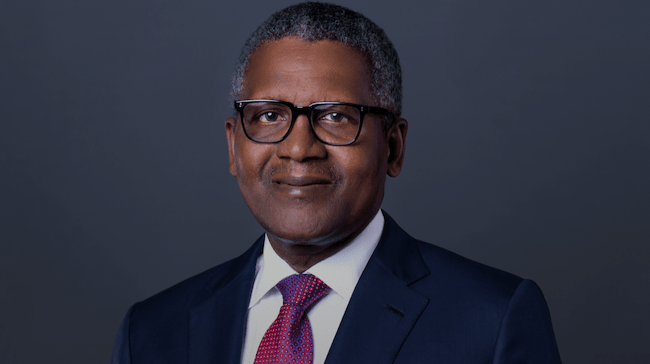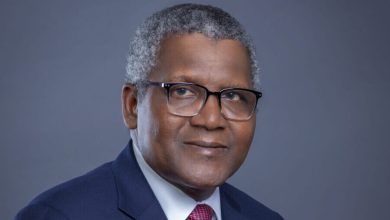
The President of Dangote Group, Aliko Dangote, has stated that Nigerians are currently paying just 55 percent of what citizens in neighbouring West African countries spend on premium motor spirit (PMS), more commonly known as petrol.
This revelation came during a high-level visit to the 650,000 barrels-per-day Dangote Refinery by the President of the Economic Community of West African States (ECOWAS) Commission, Omar Touray, and his delegation.
“In nearby countries, the pump price for petrol averages about $1 per litre, equivalent to roughly ₦1,600. At our refinery, however, we’re selling between ₦815 and ₦820 per litre,” Dangote said, in a statement issued via email to Channels Television on Sunday.
He noted that the significant price difference is often underappreciated by Nigerians, despite the fact that the cost relief is a direct outcome of local refining, which slashes transportation and import-related expenses.
“This refinery was built for Nigerians. There’s an even bigger initiative underway something we haven’t announced yet but our goal remains to ensure Nigerians reap maximum benefits from this facility,” he added.
Refinery as a Catalyst for Regional Development
While touring the state-of-the-art plant, Touray described the refinery as a “beacon of hope” and a striking example of what the African private sector can achieve. He praised Dangote’s vision and commitment to the continent.
“What I have seen here gives me renewed hope for Africa. This is the kind of infrastructure our continent must focus on. It’s extraordinary in scale, ambition, and impact. Alhaji Dangote has shown remarkable trust in Africa, and we must all rally behind such efforts,” Touray said.
Touray’s entourage included several senior ECOWAS officials such as Commissioner for Infrastructure, Energy and Digitalisation, Sediko Douka; Commissioner of Internal Services, Nazifi Abdullahi Darma; Director of Private Sector/SMEs, Tony Luka Elumelu; and Chief of Staff, Abdou Kolley.
The ECOWAS Commission president emphasized the importance of the refinery’s ability to meet the Euro V fuel standard, producing fuel with a sulphur content of 50 parts per million (ppm) a level many imported products still fail to meet. He called the refinery vital for improving public health and environmental safety across the region.
“We’re still importing fuels that fall below our regional quality standards, even when a facility like Dangote’s can meet and exceed them. This must change. The private sector should lead the charge in industrialising the ECOWAS region,” he said.
Policy Backing for Private Sector Growth
Touray used the visit as a platform to urge stronger partnerships between African governments and industrialists. He argued that economic policy must be grounded in real-world experience and directly informed by business leaders like Dangote.
“As ECOWAS marks its 50th anniversary, we are more committed than ever to engaging with the private sector,” he said. “We cannot continue to make decisions in isolation. Site visits like this help us understand their realities, challenges, and expectations.”
He noted that real development goals such as combating poverty, reducing youth unemployment, and addressing insecurity cannot be achieved by governments alone.
“The scale of transformation we seek can only be delivered by the private sector. It’s time we actively support them, listen to them, and eliminate bottlenecks that hinder their growth,” Touray said.
He concluded by pledging ECOWAS’ full backing for the Dangote Group and similar ventures, urging other African nations to emulate Nigeria by building infrastructure that not only serves their own economies, but benefits the entire continent.
Meanwhile, Aliko Dangote outlined the enormous challenges his team faced in bringing the world’s largest single-train refinery to life, underscoring the group’s resilience and long-term commitment to Africa’s economic future.





